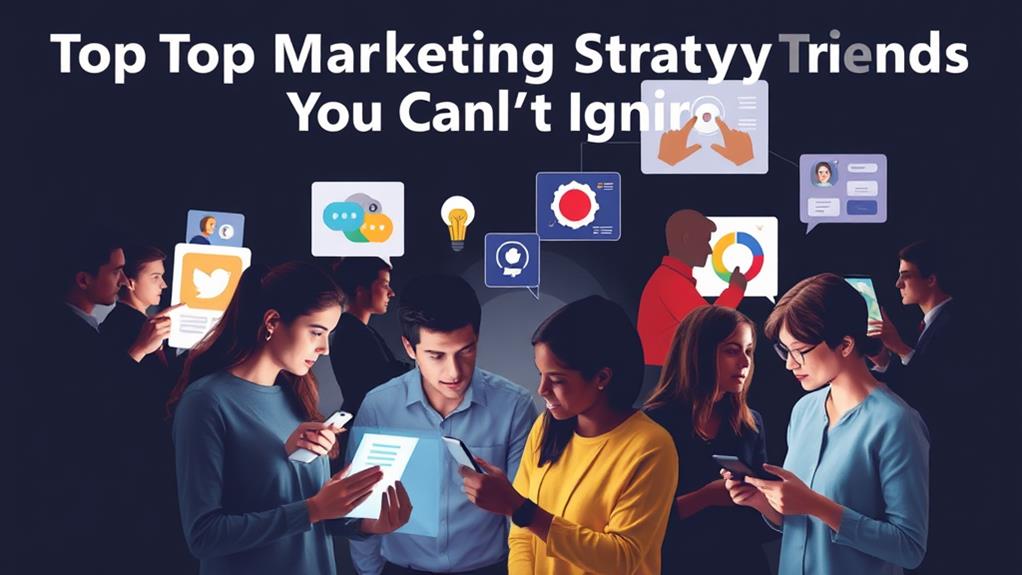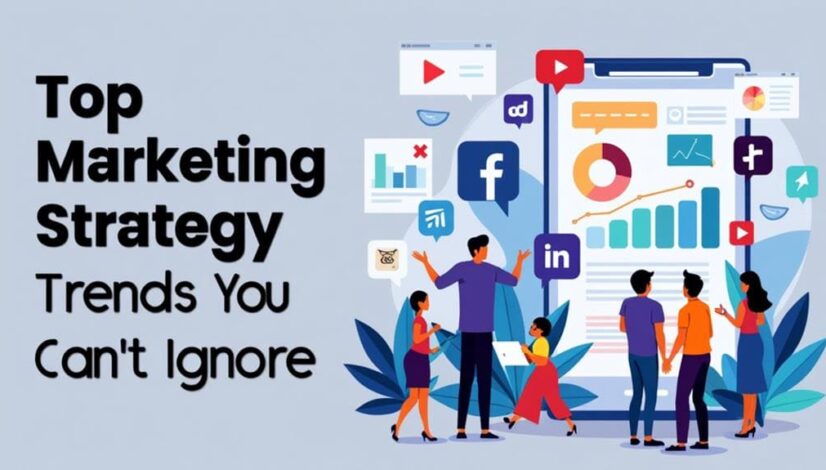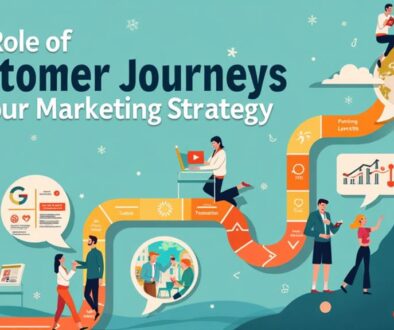Top Marketing Strategy Trends You Can’t Ignore
In today's dynamic marketing landscape, several trends demand attention. Personalization enhances engagement, as consumers favor tailored experiences. Influencer marketing pivots towards authenticity, with micro-influencers building trust in niche communities. The integration of AI and automation streamlines operations, enabling data-driven decisions that boost effectiveness. Sustainability is becoming crucial, prompting brands to adopt ethical practices that resonate with conscious consumers. Video content, especially live streaming, dominates engagement strategies. Finally, omnichannel approaches guarantee seamless customer journeys. Staying attuned to these trends is essential for brands aiming to build lasting connections and drive growth in an ever-evolving market. Insights await on how to implement these strategies effectively.
Key Takeaways
- Personalization and customer experience are vital, with 80% of consumers preferring brands that offer tailored interactions to drive purchases.
- The rise of micro-influencers emphasizes authenticity, fostering stronger connections and higher engagement rates within niche communities.
- AI and automation enhance marketing efficiency, streamlining processes and enabling more personalized campaigns through data analytics.
- Sustainable and ethical marketing practices resonate with consumers, helping brands build trust and differentiate themselves in competitive markets.
- Video content dominates engagement, with live streaming and user-generated content playing crucial roles in connecting with audiences on various platforms.
Personalization and Customer Experience

In today's competitive landscape, personalization has emerged as a cornerstone of effective marketing strategies, transforming how brands engage with their customers. The ability to tailor experiences throughout the customer journey enables companies to foster deeper connections, enhancing customer satisfaction and loyalty. This shift towards personalization is not merely a trend but a necessary evolution, reflecting consumer expectations in a digital age where options abound.
Targeted messaging has become a crucial component of this personalized approach. By leveraging data analytics and consumer insights, brands can craft communications that resonate with individual preferences, behaviors, and demographics. This fine-tuning of marketing messages guarantees that consumers receive relevant content that speaks directly to their needs, effectively guiding them along their unique customer journeys.
Moreover, personalization transcends traditional demographics; it taps into emotional intelligence, allowing brands to connect with consumers on a more profound level. This emotional engagement can lead to reinforced brand loyalty, as customers feel understood and valued, ultimately driving repeat purchases and advocacy.
For modern brands, investing in personalization is not an option, but rather a fundamental aspect of any strategic marketing initiative. Adapting to consumer demands for tailored experiences requires a robust framework, capable of continuous data analysis and innovative thinking.
Influencer Marketing Evolution
As influencer marketing continues to evolve, a clear shift towards authenticity is reshaping brand collaborations.
Consumers increasingly favor genuine connections over sheer follower counts, propelling micro-influencers to the forefront due to their targeted engagement and relatability.
This change not only enhances credibility but also fosters more meaningful interactions between brands and their audiences.
Authenticity Over Popularity
While influencer marketing has long been driven by the allure of popularity and follower counts, a significant shift is occurring within the industry, prioritizing genuine connections over superficial metrics. This evolution signals a growing recognition that brand transparency is essential for fostering meaningful relationships between influencers and their audiences.
Today's consumers are increasingly discerning; they seek authenticity in the brands they support and the influencers they follow. As a result, businesses are shifting their focus towards influencers who embody genuine narratives rather than those boasting inflated follower counts.
This strategy hinges on consumer trust, which is cultivated through honest communication and relatable content. Influencers who align with the brand's values and showcase real-life experiences resonate more profoundly with audiences, driving engagement that transcends mere numbers.
Moreover, as disillusionment with "fake" influencers grows, companies leveraging this trend can establish deeper brand loyalty. Those who prioritize authenticity over sheer popularity are better positioned to connect with consumers on a fundamental level, ultimately translating to stronger brand perception and sustained growth.
The future of influencer marketing lies in cultivating trustworthy relationships that honor both the audience's desire for authenticity and the brands' quest for lasting impact.
Micro-Influencers Rising Impact
The rise of micro-influencers is reshaping the landscape of influencer marketing, spotlighting the substantial impact these individuals have on audience engagement and brand perception.
Characterized by their authenticity and relatability, micro-influencers effectively cultivate trust within niche communities. This trust translates into actionable engagement, often outperforming their more prominent counterparts.
Here are four key reasons for the increasing relevance of micro-influencers:
- Micro-Influencer Authenticity: Their genuine approach fosters deeper connections, as audiences often perceive them as friends rather than commercial entities.
- Niche Audience Targeting: Micro-influencers typically cater to specific interests, allowing brands to reach hyper-targeted groups with tailored messaging.
- Cost-Effectiveness: Partnering with micro-influencers is frequently more affordable, providing brands with the opportunity to engage more voices for the same investment.
- Higher Engagement Rates: Studies show that micro-influencers often enjoy higher engagement rates, as their focused content resonates more profoundly with their audience.
As brands adapt to include micro-influencers in their strategies, a deeper understanding of this dynamic will be essential to harnessing its potential effectively.
AI and Automation Integration

The integration of AI and automation in marketing strategies presents a transformative opportunity for crafting personalized campaigns that resonate with individual consumers.
By harnessing data analytics and machine learning, businesses can achieve unprecedented levels of workflow efficiency, allowing for more targeted outreach and optimized resource allocation.
As technology continues to advance, the ability to engage customers on a personal level while streamlining operational processes will likely define the future of marketing excellence.
Personalized Marketing Campaigns
Eighty percent of consumers are more likely to make a purchase when brands offer personalized experiences, underscoring the critical role of personalized marketing campaigns in today's competitive landscape.
The integration of AI and automation into these campaigns enables brands to engage customers more effectively, using technology to craft tailored experiences based on individual preferences and behaviors.
Key strategies that enhance personalized marketing through AI and automation include:
- Dynamic Segmentation: Utilizing real-time data to tailor messages and offers to specific customer segments, creating a more relevant experience.
- Predictive Analytics: Leveraging historical data to anticipate future customer behavior, allowing brands to proactively address needs and desires.
- Behavioral Targeting: Analyzing user interactions to customize communications, ensuring that messages resonate and encourage engagement.
- Content Personalization: Curating individualized content, based on customer interests, to foster a deeper connection and increase conversion rates.
Streamlined Workflow Efficiency
Amid the rapid advancements in technology, integrating AI and automation into marketing workflows has emerged as a critical strategy for enhancing efficiency. As organizations seek freedom from repetitive tasks, workflow automation offers a transformative approach, liberating teams to focus on creative pursuits.
Efficiency tools, such as automated task management systems, streamline processes, allowing for better resource allocation and team collaboration.
Furthermore, process optimization through AI enhances digital workflows by ensuring that every project is meticulously tracked. Project tracking tools equipped with performance metrics not only provide insight into execution but also enable real-time adjustments, ensuring that campaigns remain agile and responsive.
The integration of sophisticated communication platforms facilitates clear dialogue among teams, fostering an environment of collaboration and innovation.
Sustainable and Ethical Marketing
In a time when consumers increasingly prioritize values over mere transactions, sustainable and ethical marketing has emerged as an essential strategy for brands seeking to resonate with conscientious audiences. This paradigm shifts marketing focus from mass consumption to shared responsibility, aligning business practices with the eco-friendly aspirations of today's consumers.
Brands embracing sustainable and ethical marketing can cultivate a loyal customer base by implementing these four key strategies:
- Transparent Communication: Offer clear information about sourcing and production practices. This cultivates trust and reinforces ethical branding.
- Eco-Friendly Practices: Adopt environmentally responsible methods such as reducing waste, utilizing sustainable materials, and enhancing energy efficiency. These practices not only lower the ecological footprint but also appeal to a growing demographic concerned about environmental impact.
- Community Engagement: Foster relationships through initiatives that support local communities and causes. Brands that give back cultivate emotional connections with consumers who value social responsibility.
- Authenticity in Storytelling: Use compelling narratives that showcase real challenges and victories in the journey towards sustainability. Stories create a relatable bridge between consumers and brands, making ethical branding more impactful.
As the demand for transparency and responsibility amplifies, brands will thrive by embracing sustainable and ethical marketing.
Beyond profitability, this approach champions a collective journey towards a better future, ensuring freedom for consumers to choose products aligned with their values.
The right marketing strategies will not only differentiate brands in a crowded marketplace but also pave the way for meaningful consumer relationships built on trust and shared ideals.
Video Content Dominance

Harnessing the power of visual storytelling, brands are increasingly prioritizing video content as a central element of their marketing strategies. The rise of platforms such as YouTube, Instagram Reels, and TikTok illustrates a paradigm shift towards video formats that captivate and engage audiences in unparalleled ways. As attention spans dwindle, video content, with its dynamic interplay of sight and sound, provides an effective medium to convey messages succinctly.
Live streaming has emerged as a game-changer, allowing brands to connect with audiences in real-time, forging authentic relationships that transcend traditional advertising. This immediacy not only fosters community engagement but also provides valuable insights into consumer preferences through direct interaction.
Brands that utilize live streaming can adapt their messaging on the fly, catering to audience feedback and questions, fostering a sense of freedom and participation often lacking in pre-recorded content.
Equally essential is the rise of user-generated video content, wherein customers themselves become advocates and storytellers for brands. By encouraging consumers to share their experiences and creativity, businesses harness the authenticity and relatability that comes from peer validation.
This shift democratizes the marketing landscape, offering brands a unique opportunity to amplify their reach organically while enriching their narrative through diverse perspectives.
In this landscape dominated by video, brands must be agile and innovative, committing to delivering visually compelling and meaningful narratives that resonate with freedom-seeking audiences, ultimately enhancing brand loyalty and driving conversions.
Omnichannel Marketing Strategies
As companies recognize the importance of a seamless customer experience, many are embracing omnichannel marketing strategies to create a unified brand presence across multiple touchpoints.
This approach not only enhances customer engagement but also fuels business growth by guaranteeing cross channel consistency. Businesses are increasingly aware that customers traverse various platforms, and consequently, aligning messaging and experiences is critical in delivering integrated customer journeys.
To implement effective omnichannel marketing, consider the following:
- Customer Insights: Utilize data analytics to understand customer behavior across all channels. This informs targeted campaigns that resonate with your audience's preferences.
- Consistent Messaging: Make sure that branding remains consistent whether customers interact via social media, email, or in-store. A cohesive message strengthens recognition and trust.
- Personalization: Leverage insights to deliver tailored experiences that meet individual needs. Personalization not only increases engagement but fosters loyalty in a competitive landscape.
- Cross-Channel Integration: Invest in technologies that enable seamless communication between channels. This integration allows for smooth shifts in customer interactions, enhancing the overall journey.
Voice Search Optimization

Voice search optimization has increasingly become an essential component of digital marketing strategies, particularly as consumers routinely turn to voice-activated devices for quick information retrieval. This surge in voice technology usage necessitates a transformation in how brands approach user intent.
Unlike traditional typing, voice search queries are often more conversational and nuanced, requiring marketers to adopt a more natural language approach and incorporate conversational keywords into their content.
To succeed in voice search, businesses should refine their local SEO efforts. Smart speakers, for instance, frequently deliver localized results, making it vital for organizations to optimize their presence in local search algorithms. This entails ensuring that business listings are accurate and aligned with how users phrase queries verbally, as voice search is often context-driven and focused on location-specific information.
Content optimization is another essential facet of voice search strategies. Crafting content that directly answers potential queries can enhance visibility on smart devices.
Using structured data and FAQ-style formats can aid in capturing voice search traffic while fulfilling user intent more effectively. As search algorithms evolve, they increasingly favor content that resonates with the natural language and conversational tone users employ when engaging with voice technology.
Social Media Engagement Trends
In recent years, the landscape of social media engagement has undergone a significant transformation, driven by evolving user behaviors and preferences. Marketers can no longer rely solely on traditional content strategies; instead, they must embrace dynamic approaches that foster authentic connections with their audiences. This necessitates a profound understanding of the trends shaping social media engagement today.
Here are four key trends to evaluate when crafting your social media strategies:
- User Generated Content (UGC): Leveraging UGC not only authenticates a brand's message but also encourages customers to become part of the brand narrative. This peer-generated approach allows for genuine connections that resonate more deeply than traditional advertising.
- Community Building: Creating spaces for interaction among like-minded individuals can enhance engagement. Social media platforms that facilitate these connections ultimately transform followers into fervent brand advocates.
- Short-Form Video Content: With platforms like TikTok leading the charge, short and compelling video content has become essential. These formats not only engage users instantly but also encourage sharing, amplifying reach organically.
- Personalization and Storytelling: Tailoring content to individual preferences and weaving compelling stories into brand communications fosters a sense of belonging, encouraging users to engage and relate on a personal level.
Incorporating these trends into your strategy allows for a more liberated engagement that champions user creativity, fostering vibrant communities while driving brand loyalty.
Embracing the conversation around social media engagement opens doors to innovative marketing possibilities that are both impactful and rewarding.
Data-Driven Decision Making

Data-driven decision making has emerged as a fundamental pillar in modern marketing strategies, transforming the way brands connect with their audiences and optimize their outreach efforts. In an era of rapidly changing consumer behavior, the ability to harness data analytics is no longer an option but a necessity. Marketing experts are increasingly relying on real-time data to gain insights into customer preferences, allowing for more personalized and impactful marketing campaigns.
At the heart of this trend lies predictive modeling, a sophisticated approach that leverages historical data to forecast future consumer behaviors. By understanding patterns and trends, brands can anticipate market shifts and align their strategies accordingly. This predictive capability enables businesses to create targeted messaging that resonates with consumers, driving higher engagement and conversion rates.
Moreover, effective data-driven decision making fosters a culture of agility and adaptability. Brands that actively analyze performance metrics can pivot their strategies quickly, responding to the needs and desires of their audience. This adaptability not only enhances customer satisfaction but also creates a competitive edge in a crowded marketplace.
Incorporating data analytics into marketing strategies facilitates informed decisions that enhance return on investment (ROI). The use of data allows brands to identify which campaigns yield the best results, directing resources efficiently and intelligently.
Ultimately, embracing data-driven decision making empowers marketers to navigate the complexities of the modern landscape, ensuring their efforts are not merely reactive but thoughtfully proactive.
Frequently Asked Questions
How Often Should Businesses Update Their Marketing Strategies?
Businesses should review and update their marketing strategies regularly, ideally every six to twelve months, to adapt to evolving market conditions and consumer preferences.
Utilizing effective strategy evaluation methods, such as performance analytics and competitor analysis, allows companies to gauge the success of their current initiatives.
A proactive marketing strategy frequency guarantees that businesses remain relevant and responsive, empowering them to achieve sustained growth and maintain competitive advantages in their respective markets.
What Budget Percentage Should Be Allocated for Digital Marketing?
How can businesses thrive in a highly competitive landscape without a robust digital marketing budget?
Allocating 10-20% of overall revenue to digital marketing is often recommended, but budget allocation strategies should be tailored to individual goals and market conditions.
Prioritizing key channels within this budget can lead to more effective outreach and engagement.
Businesses should continuously analyze performance metrics to guarantee their digital marketing budget aligns with evolving objectives and consumer behavior.
Which Analytics Tools Are Best for Measuring Campaign Success?
When evaluating the best analytics tools for measuring campaign success, consider options that excel in data visualization and real-time analytics.
Tools like Google Analytics and Tableau provide in-depth audience insights, enabling you to analyze campaign performance effectively.
In addition, leveraging conversion tracking features guarantees you assess effectiveness accurately, while competitive analysis tools like SEMrush can offer strategic context for comparisons.
Ultimately, these tools equip marketers with the freedom to make informed, data-driven decisions.
How Can Small Businesses Compete With Larger Brands Effectively?
Ah, the gallant small business, valiantly assembling against the Goliaths!
To effectively compete, embrace niche targeting, honing in on specific audiences. Master the art of brand storytelling to forge emotional connections. Engage customers through personalized marketing and vibrant social media strategies.
Foster local partnerships and influencer collaborations to amplify reach. Finally, immerse in community involvement, showcasing commitment and authenticity.
Small businesses, with their unique flair, can thrive in this vast marketplace.
What Role Does Company Culture Play in Marketing Strategy Success?
Company culture greatly influences marketing strategy success by fostering employee engagement and enhancing brand authenticity.
When employees are engaged, they become passionate ambassadors of the brand, effectively communicating its values to customers. A strong, positive culture encourages creativity and innovation, enabling businesses to adapt their marketing approaches to resonate authentically with their audience.
Ultimately, aligning internal values with external messaging cultivates a genuine connection that can differentiate a brand in a competitive marketplace.
Conclusion
In summary, the landscape of marketing strategies is continuously evolving, driven by advancements in technology and shifting consumer expectations. As the adage suggests, "The only constant in life is change," reflecting the necessity for businesses to adapt swiftly and embrace these emerging trends. Prioritizing personalization, embracing sustainability, and leveraging data analytics will not only enhance customer experiences but also guarantee competitive advantage in an increasingly dynamic market environment. Indeed, the future of marketing lies in innovation and adaptability.



